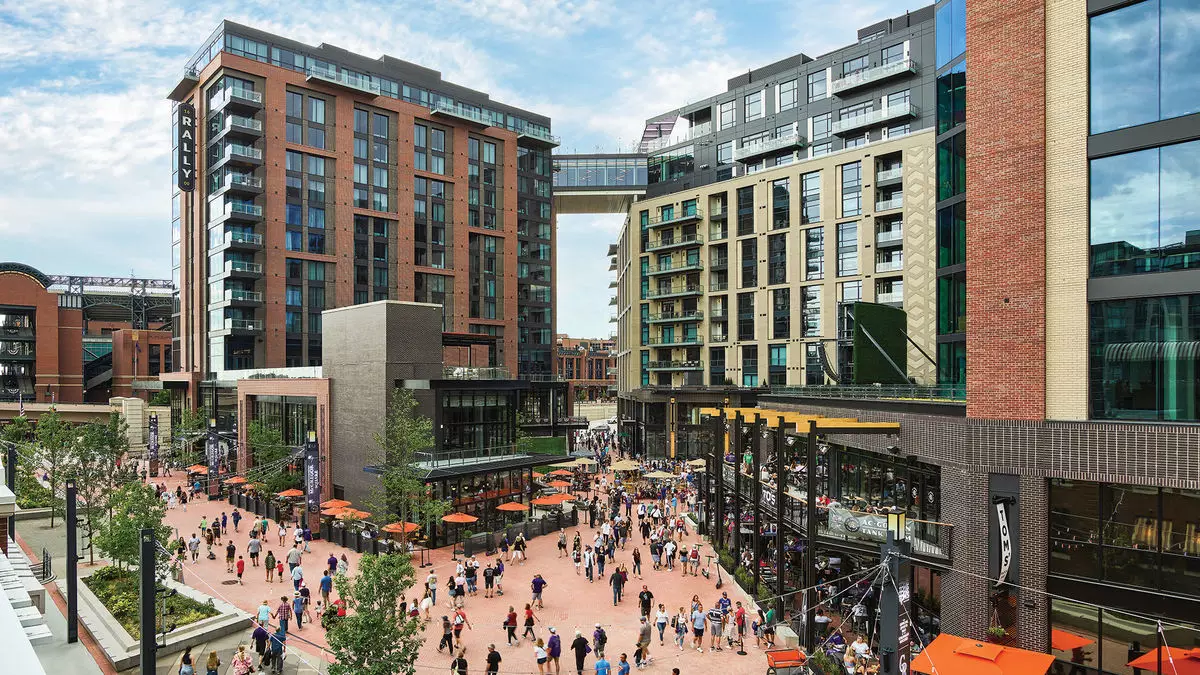The convergence of sports and hospitality is ushering in a transformative wave for both industries, with the term “sportspitality” gaining attention as more team owners and hotel operators recognize the potential synergies between their sectors. Major League Baseball’s New York Yankees are set to visit Denver this Memorial Day weekend, and the city is gearing up for an influx of fans. The Rally Hotel at McGregor Square, which is strategically located adjacent to Coors Field, stands as a testament to this burgeoning trend. Isenberg, the CEO of Sage Hospitality Group, anticipates a bustling venue filled with both Rockies enthusiasts and Yankee supporters – a symbol of how sports can galvanize communities and completely transform local economies.
The Rally Hotel is not just a hospitality venue; it’s an experience, designed specifically with the baseball fan in mind. This 182-room property, which opened in 2021, embodies how strategically placed hotels can capture a diverse clientele, from die-hard fans traveling thousands of miles to seasonal locals simply looking for a unique weekend escape. The hotel manager’s statement, “The place will be jammed,” encapsulates the anticipated atmosphere – a throbbing nexus of energy surrounding one of America’s most beloved pastimes.
Reinventing the Game
With the rise of mixed-use developments like The Rally, team owners are beginning to rethink their real estate strategies. Historically, sports venues catered primarily to game-day experiences; however, visionaries within the industry are now recognizing the need for year-round engagement. Isenberg highlighted that half of Rockies games take place away from home, urging the facility to offer a myriad of attractions beyond baseball. A vibrant plaza featuring movie nights, yoga sessions, and winter ice skating serves as an example of how modern establishments can seamlessly blend sports with broader cultural offerings, ultimately transforming the space into a communal hub.
This trend goes beyond mere novel experiences. By creating lifestyle-oriented spaces, team owners can captivate new audiences and ultimately enhance game-day attendance. The “Ultimate Baseball Fan Experience” package, offering exclusive access to Rockies tickets, is an example of how strategic hospitality partnerships can enrich the fan experience, feeding into a larger ecosystem of sports tourism.
Emerging Market Dynamics
The global sports tourism market is projected to experience phenomenal growth, projected to expand by over $701 billion between 2025 and 2029, according to Technavio. It’s no wonder that team owners are keen to intertwine their brands with real estate developments; they see the economic potential at stake. The grounding principle remains: proximity to live sports creates a premium, allowing properties to charge higher rates and maximizing revenue potential. As Matt Traub from SportsTravel states, “location, location, location” enables hotels near sports venues to capitalize on the loyal fan base willing to pay top dollar for unique experiences.
Mixed-use developments such as The Battery Atlanta, linked to the Atlanta Braves, illustrate effective strategies where retail, entertainment, and hospitality coalesce around significant sports venues. Such models are likely to inspire other sports franchises and owners to invest in adjacent real estate, setting the stage for further innovation in the hospitality sector.
Future Developments and Strategic Partnerships
Sage Hospitality Group is continuing to play a pivotal role in this evolution, evidenced by their upcoming Shinola Hotel in Indianapolis, set to launch in 2027. This property, developed in collaboration with the family that owns the Indiana Pacers, will literally bridge the gap between basketball and lodging via a pedestrian skybridge to Gainbridge Fieldhouse. This level of interconnectivity illustrates the immersive experience that “sportspitality” aims to offer, taking fan engagement to the next level.
Moreover, we are seeing established hotel chains align themselves with significant sporting events, such as Marriott’s partnership with NCAA and Hilton’s collaboration with McLaren Formula 1 racing. These partnerships are not just opportunistic; they are a recognition of the shifting dynamics where sport and tourism intertwine. This signifies a broader understanding of fan loyalty in the hospitality industry—an acknowledgment that a devoted fan base can translate directly into profitable business opportunities.
Expanding to College Territories
The sports hospitality movement is not confined to professional leagues. The emergence of Sports Illustrated Resorts, which intends to establish its first project near the University of Alabama, highlights the advantages of tapping into college sports’ fiercely devoted fan bases. The approach aims not just to leverage proximity to sporting events but also to foster deeper community connections, integrating amenities such as residential condos and vacation clubs into the sporting experience.
The Sports Events and Tourism Association has demonstrated that over 204.9 million trips were attributed to sporting events last year, contributing a staggering $52.2 billion into the economy. This statistic not only underscores the vast scope of the sports tourism market but also indicates that sustained investment in sports-adjacent hospitality will yield significant dividends for developers and communities alike. The future of sports is evolving beyond the pitch or the court; it’s gaining new dimensions through innovative ‘sportspitality’ concepts that encapsulate community spirit, a love for the game, and revenue generation all in one.


Leave a Reply